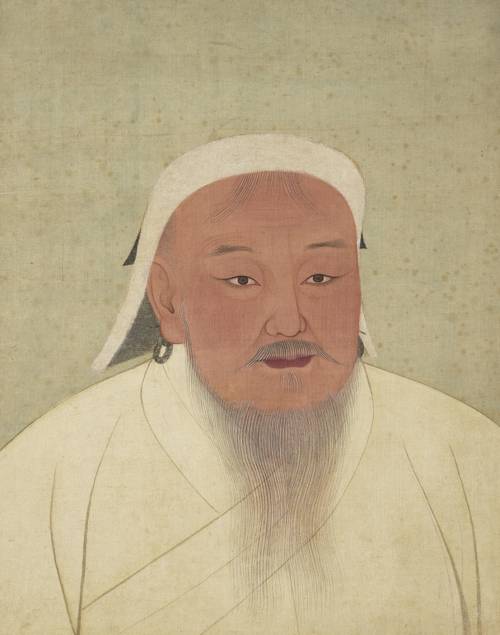
FAQ About Genghis Khan

Who was Genghis Khan?
Genghis Khan, originally named Temüjin, was a Mongolian conqueror and the founder of the Mongol Empire. He united the nomadic tribes of Northeast Asia and established one of the largest contiguous empires in history during the early 13th century.

When did Genghis Khan live?
Genghis Khan was born around 1162 near the border of modern-day Mongolia and Siberia and died in August 1227. He lived during a time of great tribal conflict in Central Asia, which he transformed into a period of unprecedented unity and military success.

What was Genghis Khan's real name?
Genghis Khan's real name was Temüjin, which he was given at birth. He was later given the title of "Genghis Khan," meaning "universal ruler," around 1206 when he united the Mongolian tribes under his rule.

How did Genghis Khan unite the Mongol tribes?
Genghis Khan united the Mongol tribes through a combination of diplomacy, military prowess, strategic alliances, and the introduction of a legal code that established a structured society under his leadership. This consolidation of power took place in the early 13th century and culminated in 1206 when he was declared the Great Khan.

What territories did the Mongol Empire cover under Genghis Khan's rule?
Under Genghis Khan's rule, the Mongol Empire expanded to cover vast territories, including much of Central Asia, parts of Eastern Europe, and modern-day China, Korea, and Russia. The empire continued to grow even after his death, eventually becoming the largest continuous land empire in history.

What was the significance of the Mongol Empire's expansion?
The expansion of the Mongol Empire under Genghis Khan had significant cultural, economic, and political impacts. It facilitated trade across the Silk Road, leading to interchange in technologies, cultures, and ideas between East and West. The Mongols also introduced administrative techniques and innovations in warfare that influenced many subsequent empires.

How did Genghis Khan impact the Silk Road?
Genghis Khan's conquest and the subsequent Mongol rule greatly enhanced the safety and efficiency of trade along the Silk Road. By securing these trade routes across Asia, the Mongol Empire facilitated economic integration, cultural exchange, and the movement of goods such as silk, spices, and precious metals between East and West.

What were some of Genghis Khan's military strategies?
Genghis Khan's military strategies included advanced cavalry tactics, the use of psychological warfare, and superior battlefield organization. He often employed highly skilled horsemen, utilized feigned retreats to confuse and defeat enemies, and integrated defeated soldiers into his own army to strengthen his forces.

How did Genghis Khan's legal code influence governance?
Genghis Khan established a legal code known as the Yassa, which helped maintain order and unity within the diverse Mongol Empire. The Yassa addressed military discipline, crime, and taxation and established principles of justice that influenced the development of governance in the regions controlled by the Mongols.

What was Genghis Khan's approach to religion within his empire?
Genghis Khan was known for his religious tolerance, allowing diverse belief systems to coexist within his empire. He granted freedom of worship to different religions, including Buddhism, Islam, Christianity, and traditional Mongolian shamanism, which helped in unifying the vast regions of his empire.

How did Genghis Khan die?
The exact circumstances of Genghis Khan's death remain uncertain. He died in August 1227, during a military campaign against the Western Xia in China. Various explanations, ranging from falling off a horse to illness, have been suggested, but none have been conclusively proven.

What happened to the Mongol Empire after Genghis Khan's death?
After Genghis Khan's death, the Mongol Empire was divided among his descendants. Despite fragmentation, the empire continued to expand under the leadership of his successors, including his son Ögedei Khan and grandson Kublai Khan, reaching its greatest territorial extent in the late 13th century.

Where is Genghis Khan buried?
The location of Genghis Khan's grave remains one of history's mysteries. According to legend, he wished to be buried in an unmarked grave, with all those who knew the location executed to keep it secret. Various efforts have been made to locate his tomb, but none have been successful so far.

What is the legacy of Genghis Khan?
Genghis Khan left a diverse legacy. On one hand, he is remembered for his brutal conquests and the deaths of millions. On the other, he is celebrated for uniting the nomadic tribes of Mongolia, creating a structured empire, and promoting trade and cultural exchanges between East and West.

How did Genghis Khan influence modern Mongolia?
Genghis Khan is revered in modern Mongolia as a national hero and a symbol of unity and strength. His image appears on currency, and numerous statues and symbols commemorate his achievements. His legacy continues to influence Mongolian culture, identity, and international perception.

Did Genghis Khan have descendants?
Yes, Genghis Khan had numerous descendants. It is believed that he fathered many children and that his lineage continued through them. Genetic studies have suggested that a significant number of men in Asia today could be direct descendants of Genghis Khan, illustrating his extensive progeny.

What were Genghis Khan's views on governance?
Genghis Khan believed in meritocracy, promoting individuals based on their abilities and skills rather than their social status or background. He implemented laws and administrative practices that emphasized loyalty, discipline, and efficiency, which were crucial to maintaining control over his expansive empire.

How is Genghis Khan viewed in contemporary culture?
In contemporary culture, Genghis Khan is a subject of both admiration and criticism. While some view him as a ruthless conqueror responsible for massive destruction, others regard him as a visionary leader who laid the foundations for modern civilization through trade and cultural exchange.

What innovations did Genghis Khan bring to the military?
Genghis Khan introduced several military innovations, including the use of composite bows, advanced siege tactics, and an effective communication system involving relay stations for quick information exchange across his vast territories. These innovations greatly contributed to the success of the Mongol army.

Why is Genghis Khan considered a successful leader?
Genghis Khan is considered a successful leader due to his extraordinary ability to unite diverse tribes, efficient and strategic military campaigns, and the establishment of a structured empire that stretched across continents. His leadership skills, vision, and reforms facilitated the growth and influence of the Mongol Empire.
